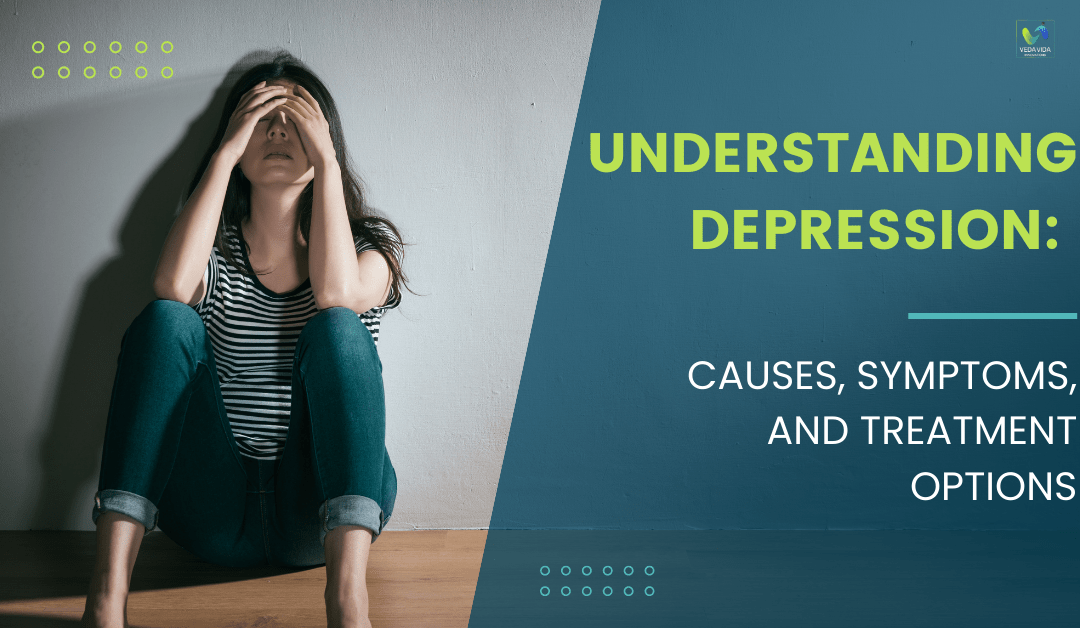
by Veda Vida | 11 Jul, 2023 | Mental Health
Depression is a mental health condition that affects millions of people worldwide. It’s more than just feeling sad or down for a brief period. Depression can impact every aspect of a person’s life, from their daily activities to their relationships and overall well-being.
There are various symptoms associated with depression, which can be categorised into four areas:
- Behavioral symptoms may include irritability, restlessness, withdrawal from activities, and even suicidal behavior.
- Physical symptoms may include fatigue, changes in eating patterns, and digestive problems.
- Cognitive symptoms may include negative thoughts, difficulty concentrating, and slow thinking.
- Psychosocial symptoms may include feelings of worthlessness, anxiety, and low self-esteem.
Depression can be classified into three major categories.
- Major depression is the most severe form of depression and can disrupt a person’s ability to function normally in daily life.
- Minor depression is a milder form of depressive symptoms that impact one’s overall sense of well-being.
- Dysthymic disorder, or dysthymia, is a chronic form of depression that impairs daily living activities for two years or longer.
Common Causes of Depression
Many of us do not realise the severity of a person dealing with depression. It is a serious medical illness and is becoming increasingly common nowadays. Several factors contribute to a person’s depression, but the common causes of depression are:
- Genetics: Depression is more prevalent in people whose blood relatives also have this condition. Researchers are trying to find genes that may cause depression.
- Brain chemistry: Neurotransmitters are naturally occurring brain chemicals that likely play a role in depression. Recent research indicates that changes in the function and effect of these neurotransmitters and how they interact with neurocircuits involved in maintaining mood stability may play a significant role in depression and its treatment.
- Hormones: The imbalance of hormones may cause or trigger depression. Hormone changes can occur during pregnancy and in the weeks or months after delivery (postpartum) and from thyroid problems, menopause, or other conditions.
- Lifestyle causes of depression:
- Stress: Stress overwhelms a person’s ability to cope and can cause depression. Researchers say high levels of the hormone cortisol, secreted during stress, affect the neurotransmitter serotonin and contribute to depression.
- Circadian rhythm disturbances: One type of depression, called seasonal affective disorder, is believed to be caused by a disturbance in the body’s normal circadian rhythm. Disruptions in circadian rhythm can also lead to a drop in serotonin and alter melatonin levels in the body, which influence mood and mental health like depression.
- Poor nutrition: A poor diet can contribute to depression in several ways. A variety of vitamin and mineral deficiencies are known to cause symptoms of depression. In addition, diets high in sugar have been associated with depression.
- Substance use: Drug and alcohol use can contribute to depressive disorders. Even some prescription drugs have been linked to depression.
Depression can be cured naturally:
Even minor depression can be dangerous if left untreated, leading to a person attempting suicide out of depression. But the good news is that depression can be treated naturally. Some Ayurvedic herbs known for their benefits in mental health include Brahmi, Ashwagandha, Shankhpushpi, Jatamansi, and Tulsi. These herbs are believed to improve mood, reduce stress and anxiety, and promote mental clarity. By using Veda Vida’s herb-based capsules, which contain these and other Ayurvedic herbs, you can overcome your depression symptoms without harmful side effects. These natural remedies have been used for centuries to promote mental health and well-being, and they may be a helpful addition to your depression treatment plan.
In conclusion, depression is a complex medical illness with a variety of contributing factors. Understanding the role of neurotransmitters and hormones in depression can help inform treatment options and lead to more effective outcomes for those struggling with this condition. If you or someone you know is experiencing symptoms of depression, it’s important to seek professional help and support to address the issue and improve overall mental health and well-being. Remember, depression is a treatable illness, and with the right support and care, recovery is possible.

by Veda Vida | 11 Jul, 2023 | Female’s Health
Understanding Menopause Symptoms: Do You Really Need Lab Tests for Diagnosis?
Menopause is a natural phase in a woman’s life that marks the end of her reproductive years. As women approach this stage, they may experience a range of symptoms that can be both physical and emotional. While many women are familiar with the common symptoms associated with menopause, such as hot flashes, night sweats, mood changes, and irregular periods, there is often confusion about the necessity of lab tests for diagnosis. In this article, we will explore whether or not lab tests are truly required to determine if a woman is going through menopause.
First and foremost, it is important to note that menopause is a natural process, and the presence of symptoms alone can indicate its onset. Hot flashes, night sweats, changes in mood, irregular periods, weight gain, thinning hair, dryness of the skin and vagina, and lower sex drive are some of the most common symptoms experienced by women transitioning into menopause. If you are experiencing these symptoms and are in the age range typically associated with menopause (usually between 45 and 55), it is likely that you are indeed going through this natural aging process.
While it is true that a doctor can assist in confirming the onset of menopause, it is not always necessary to rely on lab tests to do so. Hormonal tests, such as measuring Follicle Stimulating Hormone (FSH) and estrogen levels, have traditionally been used to determine menopausal onset. However, these tests may not always be accurate indicators, as hormonal fluctuations can vary greatly during the perimenopause phase, leading to inconsistent results.
Furthermore, hormonal therapy, such as the use of birth control pills, can significantly impact the FSH and estradiol tests, further complicating their reliability. This is why alternative diagnostic tests, such as the Anti-Müllerian hormone (AMH) Elisa test, have been developed to predict the onset of menopause more accurately. The AMH test measures a hormone produced by the ovaries, which can provide a more reliable indication of ovarian reserve and the proximity to menopause.
It is important to highlight that while lab tests may not be necessary for the diagnosis of menopause itself, they may still have a role to play in certain circumstances. For example, if there is a concern that physical changes may be a sign of an underlying illness, such as a thyroid disorder, or if spontaneous menopause occurs at an early age, further testing may be warranted. In such cases, additional tests like thyroid function tests, prolactin levels, and other relevant investigations may be recommended based on a woman’s medical history and physical examination.
At Veda Vida, we understand the challenges and discomfort that can accompany menopause. We have developed an herb-based capsule called Sushumna-M, which is specifically designed to alleviate menopausal symptoms. It is made from 100% natural ingredients and has been formulated to provide relief without any side effects. However, we always encourage women to consult with their gynecologists or healthcare providers for proper diagnosis and treatment.
In conclusion, while lab tests may not be necessary to determine menopause, it is crucial to seek medical advice if you are experiencing symptoms associated with this natural aging process. Your doctor can help assess whether the symptoms are indeed indicative of menopause or if further investigation is required to rule out other underlying conditions. While our clinic offers a natural remedy for menopausal symptoms, it is always advisable to follow your doctor’s recommendation for proper diagnosis and treatment. Remember, menopause is a unique journey for every woman, and seeking professional guidance can ensure that you navigate this phase with comfort and confidence.

by Veda Vida | 8 May, 2023 | Female’s Health
Managing Polycystic ovary syndrome (PCOS)with Diet:
Polycystic ovary syndrome (PCOS) is a hormonal disorder that affects 1 in 10 women, making it one of the most common hormonal disorders in women of reproductive age. Polycystic ovary syndrome can lead to infertility, weight gain, insulin resistance, acne, and hair growth. However, the good news is that you can manage PCOS with a healthy lifestyle, diet, and natural supplements. In this blog, we share five crucial things that you need to prioritize in your diet to manage PCOS with ease.
Maintain your meal timings
One of the most important things that you can do for your body is to maintain regular meal timings. As dietitian, Rupali Karajgir suggests, “You have to take care of your body. No one else can come and take care of your meal timings.” She emphasizes the need to have frequent meals at the same time every day, with healthy munching in between. This helps your hormones to function better and takes care of other stomach-related issues as well. Studies have shown that women who maintain regular meal timings have better insulin sensitivity, weight management, and hormone regulation.
Take fennel seeds after every meal
Fennel seeds (Saunf) are a small thing but can be very helpful in taking care of your sugar cravings. Women with PCOS often experience food cravings, especially for sugary foods. By taking fennel seeds after every meal, you can delay your sugar cravings. Recent studies have also shown that 1 tsp of fennel seeds post-lunch and 1 tsp post-dinner can reduce FSH/LH/testosterone, resulting in regular menstrual cycles. Fennel seeds are also a good source of antioxidants, which reduces oxidative stress and menstrual pain found in Polycystic ovary syndrome.
Increase your dietary fibers intake
Dietary fibers intake is crucial for everyone, especially for women with Polycystic ovary syndrome. As dietitian, Rupali Karajgir recommends, “You have to increase your dietary fibers intake. With every major meal (especially lunch and dinner), you must have one full bowl of salads. This will take care of your dietary fibers intake. Indian diet is cereal-based. We need to use flour with bran. Use millets in your diet.” By increasing your dietary fibers intake, you can improve your digestion and manage your weight. Dietary fibers-rich foods like whole grains, fruits, and vegetables help in reducing insulin resistance, inflammation, and other metabolic issues.
Prioritize fresh food over processed food
Women with Polycystic ovary syndrome should prioritize fresh food over processed food. Processed foods, including bakery items, biscuits, ketchup, juices, chips, and pickles, are harmful to your health, especially when you have Polycystic ovary syndrome. Instead of consuming fruit juices, have the whole fruit to get the best benefits out of it. Eating fresh food helps you manage your weight and hormonal imbalances. Whole foods are rich in antioxidants, dietary fibers, and nutrients that your body needs to function optimally.
Take more fluids and a mood-uplifting diet
Mood swings are a common symptom of Polycystic ovary syndrome. To tackle mood swings, you can try taking more fluids and having a mood-uplifting diet. Fruits, vegetables, natural sharbat like Bel Sharbat and Nimbu Sharbat (Lemonade), and natural fluids like coconut water or even sometimes coffee (in limited quantity) are mood-uplifting things that take care of your mood swings. Don’t forget to have proper exercise with all of the above. Exercise helps in reducing stress, improving insulin sensitivity, and overall well-being.
In conclusion, Polycystic ovary syndrome is a hormonal disorder that affects many women worldwide. However, it is a manageable condition with a healthy lifestyle, diet, and natural supplements. Prioritizing regular meal timings, taking fennel seeds after meals, increasing dietary fibers intake, prioritizing fresh food over processed food, and taking more fluids and a mood-uplifting diet can help you manage the symptoms of Polycystic ovary syndrome. These lifestyle changes, combined with proper exercise and natural supplements like Sushumna P, can help you lead a healthier life with PCOS. Remember that PCOS is a lifestyle disorder, and by making healthy lifestyle choices, you can start to reverse the symptoms and improve your overall well-being.
Polycystic ovary syndrome (PCOS) is a hormonal disorder that affects 1 in 10 women, making it one of the most common hormonal disorders in women of reproductive age. Polycystic ovary syndrome can lead to infertility, weight gain, insulin resistance, acne, and hair growth. However, the good news is that you can manage PCOS with a healthy lifestyle, diet, and natural supplements. In this blog, we share five crucial things that you need to prioritize in your diet to manage PCOS with ease.


